
The Bee Gees were a musical group formed in 1958 by brothers Barry, Robin, and Maurice Gibb. The trio were especially successful in popular music in the late 1960s and early 1970s, and later as prominent performers in the disco music era in the mid-to-late 1970s. The group sang recognisable three-part tight harmonies: Robin's clear vibrato lead vocals were a hallmark of their earlier hits, while Barry's R&B falsetto became their signature sound during the mid-to-late 1970s and 1980s. The group wrote all their own original material, as well as writing and producing several major hits for other artists, and are regarded as one of the most important and influential acts in pop-music history. They have been referred to in the media as The Disco Kings, Britain's First Family of Harmony, and The Kings of Dance Music.

Robin Hugh Gibb was a British singer and songwriter. He gained worldwide fame as a member of the Bee Gees with elder brother Barry and twin brother Maurice. Robin Gibb also had his own successful solo career. Their youngest brother Andy was also a singer.

Sir Barry Alan Crompton Gibb is a British musician, singer, songwriter and record producer. Along with his younger twin brothers, Robin and Maurice, he rose to worldwide fame as a member of the Bee Gees, one of the most commercially successful groups in the history of popular music. Gibb is well known for his wide vocal range including a far-reaching high-pitched falsetto. Gibb's career has spanned over 60 years.
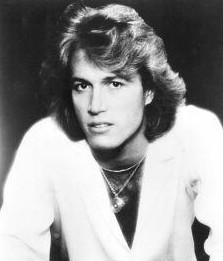
Andrew Roy Gibb was an English-Australian singer and songwriter. He was the younger brother of Barry, Robin, and Maurice Gibb, musicians who had formed the Bee Gees during the mid-1960s. Gibb came to prominence in the late-1970s through the early-1980s with eight singles reaching the Top 20 of the US Hot 100, three of which went to No. 1: "I Just Want to Be Your Everything" (1977), "(Love Is) Thicker Than Water" (1977), and "Shadow Dancing" (1978). In the early 1980s, he co-hosted the American music television series Solid Gold. He also performed in a production of The Pirates of Penzance and Joseph and the Amazing Technicolor Dreamcoat. Gibb would later struggle with drug addiction and depression. He died on 10 March 1988, five days after his 30th birthday.

Cucumber Castle is the seventh studio album by the Bee Gees, released in April 1970. It was produced by Barry Gibb, Maurice Gibb, and Robert Stigwood. It consists of songs from their television special of the same name, which was named after a song on their 1967 album Bee Gees' 1st. Cucumber Castle is the only Bee Gees album not to feature any recorded contributions from Robin Gibb, as he had left the group before the album was recorded.

Robert Colin Stigwood was an Australian-born British-resident music entrepreneur, film producer, and impresario, best known for managing musicians such as Cream, Andy Gibb, and the Bee Gees; theatrical productions such as Hair and Jesus Christ Superstar; and film productions, including Grease and Saturday Night Fever.

One Night Only is a live album and DVD/Blu-ray by the Bee Gees. It features the group's concert at the MGM Grand in Las Vegas in 1997 and includes many of their greatest hits.
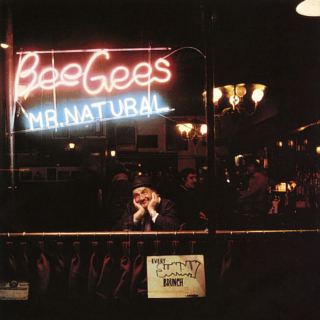
Mr. Natural is the twelfth studio album by the Bee Gees, released in 1974. It was the first Bee Gees release produced by Arif Mardin, who was partially responsible for launching the group's later major success with the follow-up album Main Course. The album's rhythm and blues, soul, funk, and hard rock sounds initiated the group's reinvention as a disco and blue-eyed soul act, which would solidify on subsequent albums. However, Barry Gibb has said that the album was "whiter" than Main Course. The cover photograph was taken at 334 West 4th Street, Greenwich Village, New York City by Frank Moscati, which is today known as The Corner Bistro tavern.

"Night Fever" is a song written and performed by the Bee Gees. It first appeared on the soundtrack to Saturday Night Fever on RSO Records. Producer Robert Stigwood wanted to call the film Saturday Night, but singer Robin Gibb expressed hesitation at the title. Stigwood liked the title Night Fever but was wary of marketing a movie with that name. The song bounded up the Billboard charts while the Bee Gees’ two previous hits from Saturday Night Fever soundtrack were still in the top ten. The record debuted on the Billboard Hot 100 Chart at #76, then leaped up 44 positions to #32. It then moved: 32–17–8–5–2–1. It remained at #1 for eight weeks, and ultimately spent 13 weeks in the top 10. For the first five weeks that "Night Fever" was at #1, "Stayin' Alive" was at #2. Also, for one week in March, Bee Gees related songs held five of the top positions on the Hot 100 chart, and four of the top five positions, with "Night Fever" at the top of the list. The B-side of "Night Fever" was a live version of "Down the Road" taken from the Bee Gees 1977 album, Here at Last... Bee Gees... Live.

Vincent Melouney is an Australian musician. He is best known as an official member of the Bee Gees from 1967 to 1969 during the group's initial period of worldwide success.

The Music for UNICEF Concert: A Gift of Song was a benefit concert of popular music held in the United Nations General Assembly in New York City on January 9, 1979. It was intended to raise money for UNICEF world hunger programs and to mark the beginning of the International Year of the Child. The concert was videotaped and broadcast the following day on NBC in the U.S. and around the world. The moderator was David Frost, with Gilda Radner and Henry Winkler also introducing some of the performers. Henry Fonda made a short appearance. Each performer signed a large parchment declaring support for UNICEF's goals.
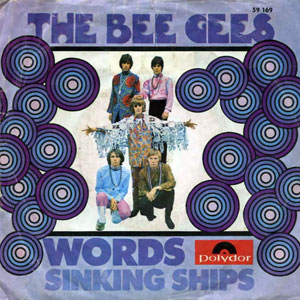
"Words" is a song by the Bee Gees, written by Barry, Robin, and Maurice Gibb. The song reached No. 1 in Germany, Canada, Switzerland, and the Netherlands.

To Whom It May Concern is the tenth album by the Bee Gees. Released in October 1972, it is the follow-up to, and continues the melancholic and personal sound of its predecessor, Trafalgar. The album was recognised as "a farewell to the old Bee Gees" as the album marked the end of an era for the group in several ways: it was their last album to be recorded solely at IBC Studios, in London, their last with conductor and arranger Bill Shepherd, who had guided them since 1967, and their last under their first contract with Robert Stigwood. Some of the songs were old ones finished or rewritten for the occasion.
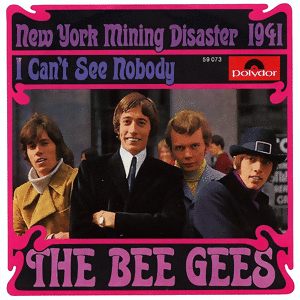
"New York Mining Disaster 1941" is the debut American single by the Bee Gees, released on 14 April 1967. It was written by Barry and Robin Gibb. Aside from a moderately successful reissue of their Australian single "Spicks and Specks," it was the first single release of the group's international career and their first song to hit the charts in both the UK and the US. It was produced by Ossie Byrne with their manager Robert Stigwood as executive producer. The song was the first track of side two on the group's international debut album, Bee Gees' 1st. This was the first single with Australian drummer Colin Petersen as an official member of the band.
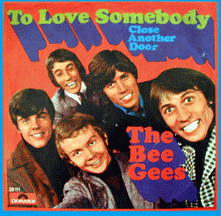
"To Love Somebody" is a song written by Barry and Robin Gibb. Produced by Robert Stigwood, it was the second single released by the Bee Gees from their international debut album, Bee Gees 1st, in 1967. The single reached No. 17 in the United States and No. 41 in the United Kingdom. The song's B-side was "Close Another Door". The single was reissued in 1980 on RSO Records with "How Can You Mend a Broken Heart" as its flipside. The song ranked at number 94 on NME magazine's "100 Best Tracks of the Sixties". The entry was a minor hit in France but reached the top 10 in Canada.

Frederick Colin Petersen is an Australian drummer, record producer and former child actor. He played as a member of the bands Steve and the Board, the Bee Gees and Humpy Bong. In August 1969, he left the Bee Gees and he was replaced by Pentangle drummer Terry Cox to record the songs for their 1970 album Cucumber Castle. His scenes from the film of the same name were cut, and he is not credited on the accompanying album soundtrack, even though he does play on some songs.

Bee Gees' 1st is the third studio album by the Bee Gees, and their first international full-length recording after two albums distributed only in Australia and New Zealand. Bee Gees' 1st was the group's debut album for the UK Polydor label, and for the US Atco label. Bee Gees 1st was released on 14 July 1967 in the UK. On 9 August it entered the UK charts; on that same day, the album was released in the US, and it entered the US charts on 26 August.

Spirits Having Flown Tour was the eighth concert tour by the Bee Gees in support of their fifteenth studio album Spirits Having Flown (1979). The tour began on 28 June 1979 in Fort Worth, Texas reaching a total of 38 cities before coming to a close on 6 October 1979 in Miami, Florida. It was their most lavish and successful tour during the height of their popularity following two straight number-one albums and six number-one singles and grossed over $10 million from 49 shows, as reported by Billboard by the end of its run. The tour was organized and promoted by Jerry Weintraub and Concerts West.

The Ultimate Bee Gees is a compilation album released to coincide with the 50th anniversary of the Bee Gees. Although the group did not start recording until 1963 on Festival Records in Australia, they began calling themselves the "Bee Gees" in 1959 after several name changes such as "Wee Johnny Hayes and the Bluecats", "The Rattlesnakes" and "BG's". Each disc is themed with the first containing more upbeat songs, called A Night Out, and the second containing slower songs and ballads, called A Night In, though the cover art does not distinguish this theme. Liner notes were written by Sir Tim Rice. This also marks the return of the 1970s era logo on an official Bee Gees release, which was last used on the Bee Gees' 1983 single "Someone Belonging to Someone".
One for All World Tour was the ninth concert tour by the Bee Gees in support of their eighteenth studio album One. The tour began on 10 April 1989 in Tokyo, Japan and ended on 7 December 1989 in Matsuyama, Japan.

















